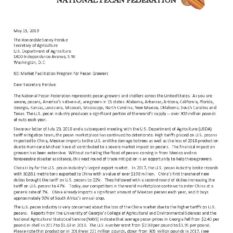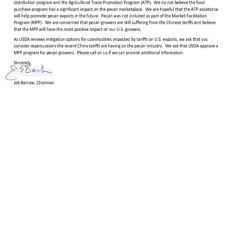Report from Capitol Hill
Pecan's working to find its seat at the table during trade mitigation talks.
- WHIP Floor Factor Increased to 70 percent. A cap of 90 percent is in the new law.
- The mortality rate for the Tree Assistance Program (TAP) has been lowered in 2018 only from 15 percent to 7.5 percent.
- USDA State Block Grants for growers.
The state block grant disaster assistance was initially used in Florida for citrus only. Approximately $340 million was allocated for this program for 2017 disaster assistance. This allocation was in addition to the WHIP 2017 program applied in Florida. The Florida citrus block grant program included the following:
- Tree Resets, Grove Rehabilitation, and Irrigation System Repair/Replacement
- Future Economic Losses
- Crop Insurance Purchase Requirements
USDA is working to get the new WHIP program processes in place as well as working with state departments of agriculture on new the block grant disaster program.
Trade Mitigation Update
The National Pecan Federation had requested that the second round of trade mitigation for pecans include Market Facilitation Payments. (see letter)
USDA released the following: “U.S. Secretary of Agriculture Sonny Perdue announced that the U.S. Department of Agriculture will take several actions to assist farmers in response to trade damage from unjustified retaliation and trade disruption. President Trump directed Secretary Perdue to craft a relief strategy to support American agricultural producers while the Administration continues to work on free, fair, and reciprocal trade deals to open more markets, in the long run, to help American farmers compete globally. Specifically, the President has authorized USDA to provide up to $16 billion in programs, which is in line with the estimated impacts of unjustified retaliatory tariffs on U.S. agricultural goods and other trade disruptions. These programs will assist agricultural producers while President Trump works to address long-standing market access barriers.”
An important takeaway for pecan growers is that they will qualify for the Market Facilitation Program (MFP) for 2019—authorized under the Commodity Credit Corporation (CCC) Charter Act and administered by the Farm Service Agency (FSA)—that will provide $14.5 billion in direct payments to producers.
According to USDA, tree nut producers, fresh sweet cherry producers, cranberry producers, and fresh grape producers will receive a payment based on 2019 acres of production. These payments will help farmers to absorb some of the additional costs of managing disrupted markets, to deal with surplus commodities, and to expand and develop new markets at home and abroad. Payments will be made in up to three tranches with the second and third tranches evaluated as market conditions and trade opportunities dictate. The first tranche will begin in late July/early August as soon as practical after the Farm Service Agency crop reporting is completed by July 15. If conditions warrant, the second and third tranches will be made in November and early January.
USDA has not announced a payment rate to date but it is expected sometime in July.
In this round of trade mitigation, pecan will likely not be part of the Food Purchase and Distribution Program (FPDP) but could still receive additional export assistance through the trade mitigation’s Agricultural Trade Promotion Program (ATP). Pecan received funds via both the FPDP and ATP programs during the first round of Trade Mitigation Assistance.
Other Trade Items
Both the U.S. House and Senate Agriculture Committees scheduled trade hearings to address issues related to China tariffs, United States-Mexico-Canada Agreement and other areas of trade. Along these lines, the House Agriculture Subcommittee on Livestock and Foreign Agriculture held a hearing on the “State of U.S. Agricultural Products in International Markets.”
Witnesses at the hearing were Ted McKinney, Under Secretary for Trade and Foreign Agricultural Affairs in the USDA, and Gregg Doud, the Chief Agricultural Negotiator in the Office of the U.S. Trade Representative.
Subcommittee Chairman Jim Costa (D-CA) opened the hearing with the following comments:
“Farm bankruptcies are at their highest in a decade. After record highs in 2013, farm income is forecast to fall below $70 billion for the third straight year. Crop prices have cratered from their record highs within the last decade to generational lows. Dairy and livestock farmers are struggling. California wine exports to Europe are down 15 percent and down 25 percent to China, and the targeting of California-grown fruits and nuts is projected to cost our growers $2.64 billion a year.
According to the USDA’s Economic Research Service, imports of agricultural goods increased by 6 percent between 2017 and 2018 while exports only grew one percent. As you can see on the screen, these factors have led the U.S. to the smallest agricultural trade surplus in over a decade. And then there’s the weather: flooding continues to ravage prime corn and soybean regions in the Midwest; hurricanes battered cotton, rice and specialty crop producers in the South; drought has had a particular impact on the livestock and row-crop guys in the southern Great Plains and throughout eastern California; and wildfires took a disproportionate toll on both timber and wine grape growers across California.”
The hearing continued with questioning from representatives. During Congressman Josh Harder’s (D-CA) questioning, he mentioned tree nuts from his district were being rejected at ports of entry in Japan, causing significant losses for American producers. Below is the exchange that followed.
Congressman Harder: Tree nuts going into Japan are being rejected at Japanese ports of entry…
McKinney: “More familiar with the issues we are facing in the EU. Right now, I think it deals with very low levels of Aflatoxin. Some countries choose to go with a lower level than Codex and that is their right. Which is why we are continuing to promote the Codex MRL, which already is a very safe and low standard.”
Congressman Harder: What are the avenues we can explore to fix it?
McKinney: “The best thing is to get it so that it goes in first. Sometimes there are pre-certification or pre-export programs that have worked. I know with Australia; on some other products, we are working to keep that program alive so that the moment it leaves the ports we know it’s going to be accepted in said country. I think that’s another thing we will look at and we have seen success. [There’s] always a cost to that and we have to calculate that in, but it’s better than finding a rerouting cost that gets it from another country. Mostly though, we want to get uniform standards that are uniform as much as possible around the world and that’s why we are working so hard on Codex.”
Additionally, the U.S. Senate Agriculture Committee has scheduled a hearing on “Certainty in the Global Markets for the U.S. Agriculture Sector.” Witnesses scheduled to testify include:
- Robert Johansson, Chief Economist for United States Department of Agriculture
- Ted McKinney, Under Secretary for Trade and Foreign Agricultural Affairs for the United States Department of Agriculture
- Gregg Doud, Chief Agricultural Negotiator in the Office of United States Trade Representative
As these hearings continue, the National Pecan Federation will continue to make sure pecan’s voice is being heard in Washington.



